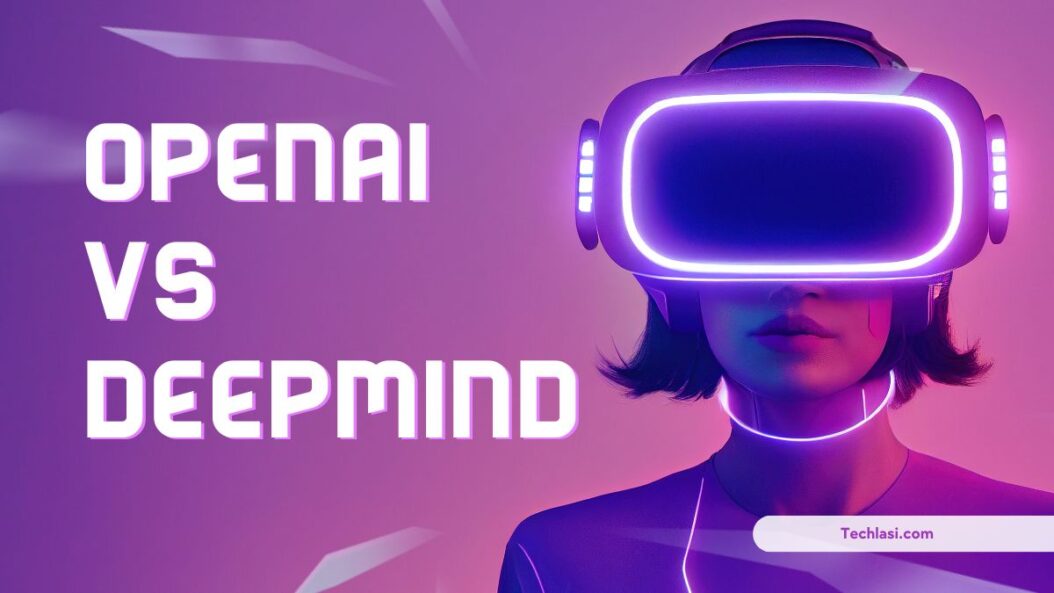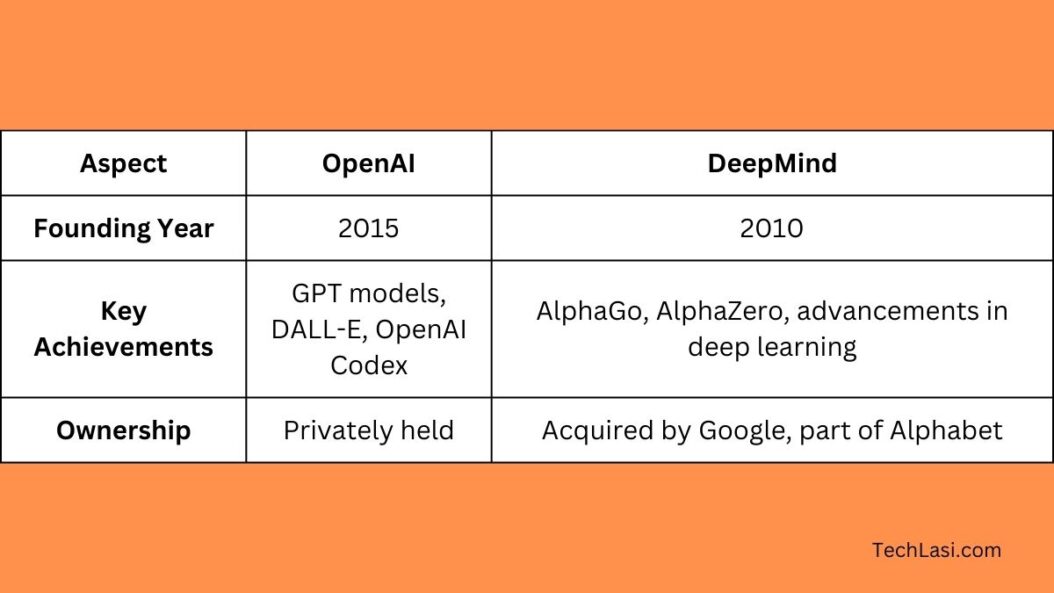Artificial intelligence (AI) has advanced rapidly in recent years thanks to breakthroughs from leading companies like OpenAI and DeepMind. These two trailblazers are at the forefront of developing cutting-edge AI capabilities. But how exactly do they compare in their missions and progress?

Introducing OpenAI
OpenAI burst onto the scene in 2015 when it was founded as a non-profit by big names like Elon Musk, Sam Altman, and others. The expressed goal was to freely advance AI in a way that benefits humanity. To that end, OpenAI has taken an open approach to much of its research. This transparency allows greater collaboration with entities outside their own walls. The non-profit also created an for-profit arm in 2019 called OpenAI LP.
DeepMind Storms the Scene
Not to be outdone, DeepMind emerged in 2010 founded by researcher Demis Hassabis along with Shane Legg and Mustafa Suleyman. Google purchased the UK-based startup in 2014. Still, DeepMind operates under the umbrella of parent company Alphabet with a fair amount of autonomy. It similarly works on advancing AI, focusing heavily on developing human-level intelligence across the board.
Comparing Research Outputs
Both trailblazers have made tremendous inroads advancing AI capabilities. Each has strengths and weaknesses based on research outputs.
OpenAI’s Major Breakthroughs
Some landmark innovations from OpenAI include:
- GPT-4 – Language model with astounding natural language abilities, building on the earlier GPT-3 release.
- DALL-E – AI system capable of generating images from text captions and descriptions.
- CLIP – Model that connects images and language through natural language processing.
Additionally, the nonprofit open sourced its AI training code used for models like GPT-3. This supports collaboration and transparency.
DeepMind’s Pioneering Achievements
Meanwhile, DeepMind has unleashed its own groundbreaking systems:
- AlphaGo – Historic program that defeated the world champion in the complex game Go.
- AlphaFold – Breakthrough AI system predicting 3D protein structure to support medical research.
- AlphaCode – Novel AI that can generate computer source code to tackle programming challenges.
The company also created the Isaac Gym, a virtual simulator supporting AI agent training for real-world robotics applications.
Key Differences in Approaches
While both entities push major advancements in AI capabilities, their underlying approaches differ in a few key ways.

OpenAI’s Philosophy
OpenAI upholds a philosophy of transparency with many research endeavors. They open source some training frameworks and offer access to models via APIs. Cultivating beneficial and safe AI for humanity guides their mission.
DeepMind’s Strategies
Alternatively, DeepMind rarely open sources full model architectures or training code. Instead, the company reveals research methodologies through published papers. Building general intelligence guides their research, along with applying AI for social benefit.
Racing Towards the Future
AI innovation moves swiftly, and both trailblazers score big wins while neck-and-neck in the race towards immense progress.
OpenAI’s Ongoing Challenges
OpenAI grapples with balancing open progress with mitigating harmful applications as models become vastly more capable. They now implement various measures to promote safe abilities.
DeepMind’s Upcoming Goals
DeepMind faces its own pressures to operate under the umbrella of a larger for-profit while upholding lofty research ambitions. Their independent team marches onwards targeting models edging closer towards the cutting edge of intelligence.
Who Holds the Advantage?
With so much talent and backing fueling both crews, who currently holds the advantage is up for debate.
OpenAI’s Strengths
OpenAI benefits greatly from wide-ranging collaborations outside its walls. The open approach connects them to brilliant minds across various domains. Partnerships amplify innovation. They also enjoy support from investors like Microsoft, allowing access to world-class computing infrastructure. The recent startup also nimbly adapts objectives.
DeepMind’s Assets
Yet DeepMind boasts its own assets, including abundant funding and computing muscle via Alphabet. The company also retains top AI researchers lured by the pure researchAmbitious missions galvanize researchers. Alphabet assimilation grants an incredible wealth of talent driving progress through partnerships with Google and others. The UK-based startup also benefits from strong geographic neural network concentrations.
And the Winner Is…
So when all is said and done in this exciting race, who claims the leading spot? The winner resides in…the greater future advancement of AI capabilities.
Pushing Progress Together
Rather than a single champion, it is humanity as a whole that wins. The innovations driven by OpenAI, DeepMind, and other AI trailblazers will usher in a new era of technological advancement.
The Road Ahead
As AI rapidly transforms society, some crucial questions remain:
- How to balance rapid progress with ethics?
- Will benefits outweigh potential pitfalls?
- What does the future look like when AI matches and exceeds human intelligence?
The path ahead remains unclear, but with thoughtful guidance, AI promises to unlock immense potential that can uplift humanity. OpenAI, DeepMind and peers help light the way.
Conclusion
In the race to progress AI, OpenAI and DeepMind represent two brilliant competitors. They employ differing philosophies and strategies, yet share the mutual goal of trailblazing innovations in artificial intelligence. Landmark achievements from protein folding predictions to creative image generation demonstrate these leaders’ immense capabilities. As they push towards developing advanced systems matching and exceeding human abilities, each entity grapples with crucial questions around managing such rapidly accelerating technologies. However, by upholding ethics and affirming positive visions, the innovations driven by AI pioneers promise to unlock immense potential. Though the road ahead remains filled with uncertainties, humanity seemingly guarantees enormous progress from these determined trailblazers.
FAQs
What is OpenAI?
OpenAI is nonprofit artificial intelligence research company founded in 2015 to advance AI in a way that benefits humanity. Key innovations include natural language models like GPT-3 and image generation systems such as DALL-E.
What is DeepMind and who owns it?
DeepMind is an artificial intelligence startup founded in 2010, specializing in machine learning techniques. In 2014 it was purchased by Google / Alphabet and now operates under their umbrella with some autonomy.
What are the key differences between OpenAI and DeepMind?
While both push major AI progress, OpenAI promotes open sourcing and collaboration while DeepMind rarely reveals model architectures but outlines techniques in papers. OpenAI focuses more on transparency while DeepMind targets developing advanced general intelligence.
What major innovations has DeepMind achieved?
DeepMind has achieved landmark systems such as AlphaGo which beat a world champion at the complex game Go, AlphaFold for predicting protein folding structures to aid research, and AlphaCode for automatically generating computer source code.
What advantages does OpenAI have over DeepMind?
Advantages include open collaborations that expand innovation, backing by investors like Microsoft providing world-class computing infrastructure, and adaptable objectives. As a nonprofit, OpenAI also more rapidly changes goals as needed.
- Top 10 AI Image Generators Without Censorship 2025 - July 2, 2025
- How Shopping Habits Transform with AI in 2025 - June 29, 2025
- Your Organization’s Data Cannot Be Pasted Here: Complete Solutions Guide for 2025 - June 24, 2025
